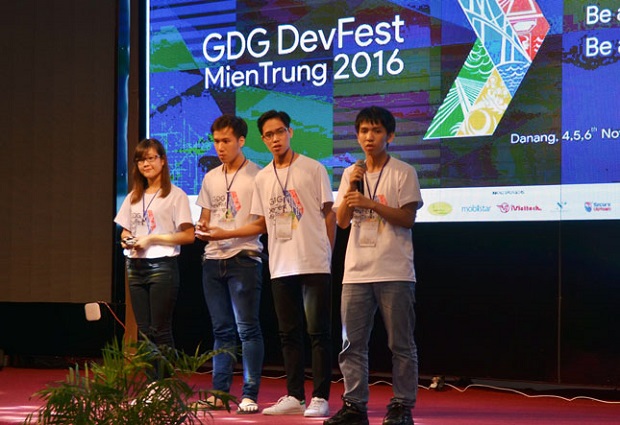Encouraging more students to develop their own start-up projects
Over recent years, many students from universities and junior colleges in Da Nang have won top prizes at scientific research contests at local, regional and national levels. However, many of these prize winners do not then progress with their ideas and develop start-up business projects.
 |
| A team makes its oral presentation to the judging board of the Mobile Hackathon contest |
At the recent Mobile Hackathon contest, for example, an application called ‘Go Market’ received the highest number of votes from the public. However, the application’s developers, who were final-year students from the FPT Polytechnic junior college, are now too busy to work on their product because they are preparing for their graduation exams, or for their upcoming internship courses at local IT businesses.
Vu Van Thanh, a lecturer from the Faculty of Electronics and Telecommunications at the city’s University of Technology and Science, remarked that the main reason for failing to bring start-up ideas to fruition is the severe shortage of capital to conduct commercialisation activities for research projects. Also, after the scientific research contests end, students usually resume their studies and face a busy academic schedule in their universities and colleges.
The Director of the Start-up Centre at the city’s Duy Tan University, Mr Nguyen Van Tien, emphasised that strong passion, financial resources and start-up capacity play a vital role in bringing start-up ideas to fruition. However, only a few students from the Faculty of Science and Technology are fully aware of the need to learn more about consumer markets, promote financial management, perfect their products, and employ human resources to develop their start-up projects.
In reality, many students who gain top prizes in the research contests seem to prefer to choose academic job opportunities or continue their studying dreams after their tertiary graduation rather than develop their own start-up projects.
Mr Tien also said that his university plans to promote its start-up promotion activities, which will include training courses on seeking start-up ideas, investment attraction programmes, and seminars for the existing students to talk to graduates about their successful start-up projects. The university is aiming to ensure that 70% of its start-up projects are inspired by scientific research work by its students.
The Vice Rector of the Information Technology Junior College, Mr Huynh Cong Phat, highlighted the important role of local tertiary establishments in developing a sustainable start-up ecosystem, with special heed being paid to introducing their students to basic start-up knowledge.
The Chairman of the Da Nang Coordination Council for the Business Start-up Network, Mr Vo Duy Khuong, highlighted closer links between universities, students’ associations, the business incubators centre, businesses and related organisations to arouse the business start-up spirit amongst local ambitious and passionate students.